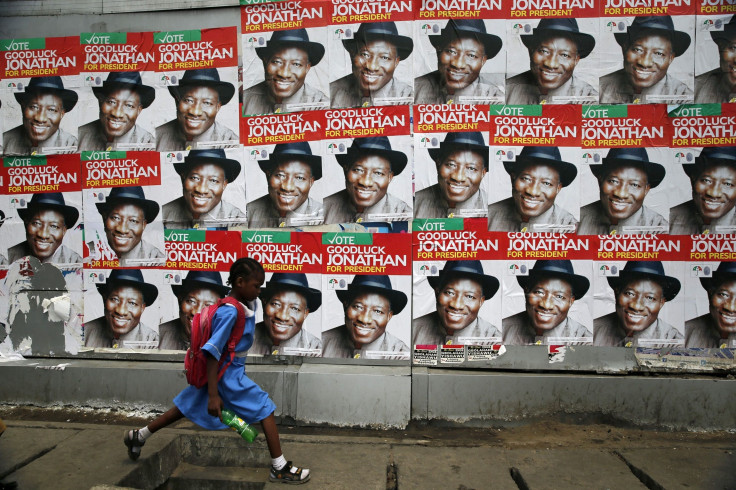Nigeria Election 2015: Struggling Economy Poses Problems For Jonathan Or Buhari

Nigerians head to the polls this weekend to choose between incumbent President Goodluck Jonathan and challenger Muhammadu Buhari, and while the country's ongoing battle against Boko Haram dominates the political rhetoric and will likely sway many voters, an economic crisis looms --and neither candidate is outlining a solution.
The election's winner will face a major gap in funding, thanks to the tumbling price of oil, which accounts for the vast majority of Nigeria's public revenue. As crude prices continue to trend lower, the country's currency continues to weaken, and investors are losing confidence amid corruption allegations and the possibility of postelection violence. No matter who the new president is, these problems bode ill for Nigeria’s economic outlook this year.
“The economy remains heavily reliant on the oil sector, which is not likely to change postelection,” said Angus Downie, head of economic research at pan-African banking conglomerate Ecobank. “The impact arising from low global oil prices will remain the main issue for the authorities to tackle once the elections have taken place.”
Downie explained that Nigeria needs serious structural reforms to diversify the sources of government revenue. But this won’t come easy.
“There are various obstacles that would likely prevent them from being successfully implemented,” he said, noting that these range from weak economic policies to bottlenecks in infrastructure.
Fueled by massive crude reserves in the Niger Delta, Nigeria experienced exponential growth over the last decade and last year overtook South Africa as the largest economy on the continent. But the global oil price has fallen more than 50 percent in recent months, taking Nigeria’s currency with it.
Even when business was good, the economic benefits were not evenly distributed. More than a third of Nigerians still live below the poverty line, and youth unemployment has stayed relatively static at 17 percent, according to the World Bank. And as the naira continues to tumble, these problems have only been exacerbated.
As Nigerian Finance Minister Ngozi Okonjo-Iweala has outlined in a handful of speeches and interviews this year, the solution is to diversify the Nigerian economy beyond the oil sector. But making the shift isn’t easy. The 2.5 million barrels of oil produced every day account for roughly 90 percent of Nigeria’s foreign income and two-thirds of government revenue, according to Bloomberg.
“Major economic policies are likely to be short-term responses to Nigeria’s oil-induced fiscal shortfall rather than a strategic effort to cut waste or reform an economy that ranks among the world’s least competitive,” wrote Capital Economics Africa analyst John Ashbourne in a Wednesday report. “Neither candidate has a clear plan for tackling the economic impact of lower oil prices.”
If Jonathan, 57, is re-elected, analysts expect to see more of the same policies that got Nigeria into its current situation, coupled with widespread corruption. Nigeria currently ranks 136 out of 173 on Amnesty International’s Corruption Perceptions Index, tied with Russia, Iran and Kyrgyzstan. Last year, watchdogs criticized Jonathan’s decision to dismiss the central bank governor, Lamido Sanusi, after he penned a letter to the government about $20 billion in oil revenues that had not been accounted for.
“We expect that another term for President Jonathan would be marked by the inaction and policy drift that has characterised his time in office until now,” Ashbourne wrote.
On the other hand, former military ruler Buhari, 72, has gained popularity for his tough stance on security and his promises to weed out corruption.
“In reforming the economy, we will use savings that arise from blocking these leakages and the proceeds recovered from corruption to fund our party’s social investments programs,” Buhari said in a recent speech at Chatham House in London.
But even if he is elected and does manage to follow through on these promises, the transition won’t fix the economy overnight.
“It is certainly welcome that Mr. Buhari has focused his campaign on the pressing issues of tackling corruption and reforming the oil sector,” Ashbourne wrote, adding that making the change will be tough in the short term, as “more populist policies could strain Nigeria’s public finances and worry some foreign investors.”
The International Monetary Fund recently downgraded Nigeria’s economic growth forecast for 2015, predicting its GDP will increase by just 4.8 percent, down from 6.1 percent in 2014, and Standard & Poor’s reduced the country’s rating to B+, four levels below investment grade. S&P estimated that Nigeria’s current account surplus will become a deficit of roughly 1.8 percent for 2015-2018. Nigeria currently ranks 127 out of 144 countries on the World Economic Forum’s Global Competitiveness Index. According to the Financial Times, investors have pulled roughly $8 billion in portfolio investments out of the country in the run-up to elections, fearing instability.
It’s a logical prediction. Since the end of military rule in 1999, Nigerian elections have been fraught with unrest and even violence. When Jonathan was elected in 2011, at least 800 people were killed during postelection riots, according to Human Rights Watch. This year, tensions are running especially high due to the ongoing Boko Haram conflict in the northeast that has left thousands killed and millions displaced.
The situation is already escalating. Authorities have closed all borders to the country until after the election, and two Al Jazeera journalists were recently detained for “loitering” in the country’s unstable northeast.
Polls indicate that this presidential race may be the closest in Nigeria’s history. While the outcome is difficult to predict, there is no question that the winner faces a difficult year ahead.
© Copyright IBTimes 2024. All rights reserved.




















